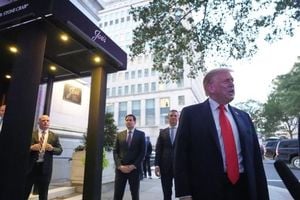iRobot is currently facing severe financial difficulties, with significant declines noted in its stock price as of March 14, 2025. Reports indicate substantial doubts about the company's ability to continue operating amid increasing competition and changing market dynamics. The company, widely recognized for its flagship product, the Roomba vacuum cleaner, announced $77.1 million losses for the fourth quarter of 2024, illustrating the dire financial state of the once-dominant robotics manufacturer.
Compounding these troubles is Amazon's recent decision to abandon its planned $1.4 billion acquisition of iRobot, largely influenced by regulatory scrutiny from European Union (EU) competition authorities. The pressures from these authorities have left iRobot with limited options as it grapples with its mounting financial woes. Following this setback, the iRobot board of directors is reportedly considering various strategies, including debt refinancing and potentially selling the company to stabilize operations.
Adding to iRobot's struggles is the rapid advancement of competing products from Chinese manufacturers like Beijing Roborock Technology. These new robotic cleaners are challenging iRobot's market position, offering innovative features such as arms capable of wiping floors and legs to navigate obstacles. These advancements come as Roborock recently introduced products equipped with artificial intelligence technology to recognize and categorize objects, allowing them to tidy spaces more efficiently than ever. A Roborock representative stated, "The enhanced AI recognizes objects and moves them to their appropriate places,” showcasing the technology's superiority over existing offerings.
Meanwhile, iRobot has seen its sales decrease by 44%, raising alarms about its market viability and ability to innovate under current economic conditions. Acknowledging this harsh reality, iRobot's management stated, "There are significant doubts about its ability to continue as a going concern.” This climate of uncertainty is pushing the company to reassess its market strategy at a pivotal time, right before the holiday season when consumer demand typically peaks. iRobot's officials have expressed concerns over the timing of major customer orders and the performance of new products launched during this key selling period.
Despite these challenges, the road to recovery is uncertain for iRobot, as it faces fierce competition not just from established players but also from agile foreign ventures reconfiguring the robotic vacuum space. The company's future hinges on not only its ability to refinance debts and possibly restructure relationships with investors but also on its capacity to innovate products significantly attractive to consumers. With market conditions shifting so rapidly, the challenge now is transforming operational hurdles and backpedaling sales trends to revitalizing its product line.
The emergence of advanced competitors like Roborock is undoubtedly forcing iRobot to reevaluate its business model, particularly its product development strategy. Experts suggest the company must overcome hurdles posed by not just consumer demand and competition but also macroeconomic factors and potential tariffs. iRobot's leadership has cautioned, "New product launches have no guarantee of success due to factors such as consumer demand, competition, macroeconomic conditions, and tariff policies.” This wide array of challenges could thwart any efforts the company makes to regain market ground.
Looking forward, iRobot will need significant shifts and strategic maneuvers to avert potential downfall. Whether through adaptive marketing, technological improvements, or viable structural changes, it remains to be seen how iRobot can muster the resources and innovation necessary to reclaim its position as the leader of the robotic cleaning market. With consumer expectations rapidly changing and competition intensifying, iRobot must act quickly and decisively to sustain its brand legacy.



